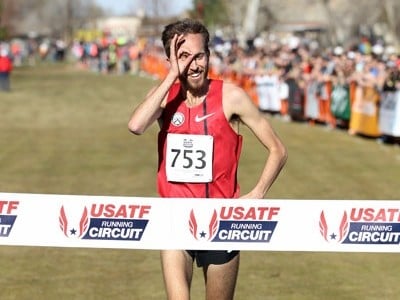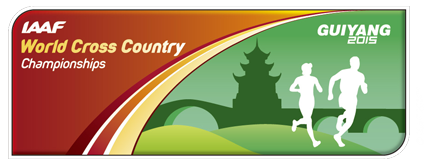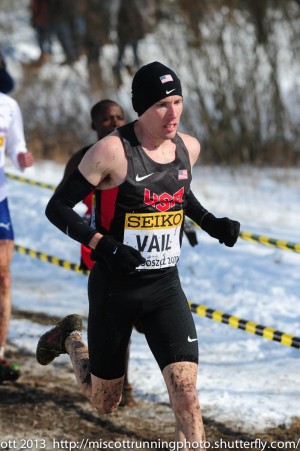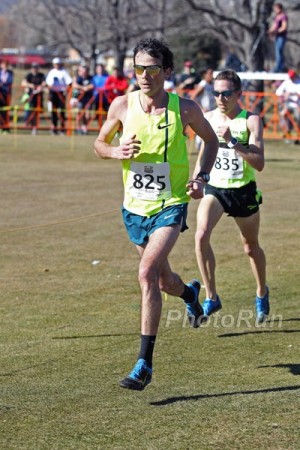Can Chris Derrick Lead The US To A Medal At The 2015 World Cross-Country Championships?
By LetsRun.com
March 25, 2015
After two years of waiting, the world’s hardest race to win (aka the “world’s greatest footrace”) is almost upon us. On Saturday afternoon (late Friday, early Saturday morning in the U.S.), 444 athletes from 51 countries will assemble in Guiyang, China, for the 41st World Cross Country Championships. The combination of top-end talent, a challenging course and national pride means there isn’t another race quite like World XC anywhere on the planet. We’ll be previewing the races all week long and LetsRun.com’s Robert Johnson will be providing on-site coverage from China.
Today, we take a look at the U.S. men’s team, which will attempt to medal at consecutive World XC Champs for the first time since 1985-86. Race details below, followed by our preview.
What: 2015 IAAF World Cross Country Championships
When: Saturday, March 28 (late Friday night U.S. time)
Where: Guiyang, China
Entries * Official site * Local organizing committee site * 2013 LRC World XC coverage *Men’s international preview
Schedule
Women’s junior 6K race: 12 midnight Friday night ET/9:00 p.m. Pacific
Men’s junior 8K race: 12:30 a.m. Saturday morning ET/9:30 p.m. Fri. night Pacific
Women’s senior 8K race: 1:15 a.m. ET/10:15 p.m. Pacific
Men’s senior 12K race: 2:10 a.m. ET/11:10 p.m. Pacific
Universal Sports Network will have tape-delayed coverage starting at 12:00 p.m. ET on Sunday (a day later).
Important note: Guiyang sits at 4,183 feet of elevation. Since the top teams — save for the U.S. — all hail from countries whose athletes are no stranger to elevation (and the U.S. trials were held at 5,430 feet in Boulder), it may not make a huge impact but it is something to consider. Another thing to consider, Guiyang is one of China’s “least sunny major cities” and it gets a lot of precipitation. Rain is forecast for Friday and Saturday. Will the race be muddy and help “mudders”? LetsRun.com will be on site to tell you.
Meet Team USA
| Name | Previous World XC finishes | Notable PRs | Best NCAA XC finish | Comment |
| Chris Derrick | 15th 2009 (jr. race); 10th 2013 | 13:08/27:31 | 2nd | Top returning non-African won 3rd straight USA XC title in dominating fashion |
| Bobby Curtis | 37th 2009; 47th 2010 | 13:18/27:24 | 4th | Finished as top American at Chicago Marathon last year (9th/2:11:20) |
| Ryan Vail | 77th 2005 (jr.); 33rd 2009; 44th 2010; 17th 2013 | 13:28/27:44/2:10:57 | 9th | 5th at U.S. 15K Champs on 3/15 (44:54) |
| Patrick Smyth | 35th 2010 | 13:39/28:25/62:01 | 11th | ND grad won XTERRA Trail Run World Champs in Dec.; 10th at World Mtn. Running Champs in Sep. |
| Maksim Korolev | none | 7:51/13:42 | 3rd | Stanford grad student was 3rd & 4th at NCAA XC last two years |
| Andrew Colley | 42nd 2010 (jr. race) | 13:40/29:11 | 7th | NC State grad ran 30:17 road 10k on 3/7 |
Two years ago, the U.S. men entered Bydgoszcz as underdogs and left with their first senior medal at World XC since 2001, a silver, defeating Kenya in the process, an event we hailed as the “Miracle on Dirt.” Two years on, the Americans won’t be sneaking up on anybody. Another silver is going to be a tough ask against the defending-champion Ethiopians and a reloaded Kenyan team led by 26:52 man Bedan Karoki and World Half Marathon champ Geoffrey Kamworor. But the bronze medal is a very real possibility. Will it happen? Here are two reasons why the Americans will medal once again — and two why they won’t.
Why the U.S. men WILL medal at World XC
1) Experience
Of the six-man U.S. squad, Maksim Korolev is the only one never to have run World XC in the past, though he did run XC last fall for Stanford (finishing fourth at NCAAs). Even better, Chris Derrick and Ryan Vail were both on the U.S. squad that took silver in 2013, with Derrick taking 10th overall (second USA) and Vail 17th (third USA). Additionally, both of those guys have progressed nicely as runners in the two years since that race. Check out their career accomplishments at the time of World XC in 2013 compared to now:
Chris Derrick
| 2013 | 2015 | |
| 5,000 pb | 13:12.00 | 13:08.04 |
| 10,000 pb | 27:31.38 | 27:31.38 |
| Best finish at USA outdoors | 4th | 2nd |
| USA XC winning margin | 6 secs | 30 secs |
Ryan Vail
| 2013 | 2015 | |
| 5,000 pb | 13:32.10 | 13:28.11 |
| 10,000 pb | 27:51.07 | 27:44.05 |
| Marathon pb | 2:11:45 | 2:10:57 |
| Best finish at USA outdoors | 6th | 3rd |
| Place at USA XC | 6th | 4th |
Both are better runners than they were two years ago. If that’s reflected in the results on Saturday, with each improving a few spots on his 2013 finish, the U.S. team will be in good shape.
2) Mud
In cross country, course conditions are important. When it rains on the track, everyone gets wet but it usually doesn’t change the race that much. A few puddles on the track just don’t make that much of a difference in a distance race. When it rains in cross country, the course becomes muddy and the footing more treacherous, which can definitely have an effect on the outcome of the race. Muddy courses slow everyone down and can sometimes level the playing field, giving hope to teams that otherwise wouldn’t have any. In 2011, World XC was held in sunny Spain and the U.S. men finished ninth. Two years later, on a cold, muddy day in Poland with snow lining the course, the U.S. men were second.
Right now, you might be thinking, “Wait a minute. World XC was in Poland in 2010 as well and the U.S. men were only ninth there.” While that’s true, the course conditions were better in 2010 than they were in 2013. If you don’t believe us, check out the photo galleries for proof (2010; 2013).
Was the weather the only reason why the U.S. men took silver two years ago? No. With Ben True, Derrick and Vail, the 2013 U.S. team was stronger than any recent edition, so even if the championships had been in Spain again, they likely would have done well. But the course conditions played into the Americans’ hands. True is from Maine and trains in New Hampshire. Derrick is an Illinois native. Neither is a stranger to the cold or mud.
In soccer, the United States gets to choose where it hosts its World Cup qualifiers. There’s a reason why it picks cities like Columbus, Kansas City and Denver rather than Los Angeles or Miami for games in the colder months of the year — it gives them an advantage over nations unused to the cold. In February 2008, Mexico and the U.S. tied in Mexico City, 2-2. In February 2009, the two sides met again in Columbus and the U.S. prevailed, 2-0.
Likewise, if the U.S. got to host World XC, you can bet it wouldn’t hold it in California or Florida. It makes more sense to hold it in a northern state, where the Americans are more prepared for the conditions than the east Africans.
So what does this have to do with Saturday’s race? Well, there’s rain in the forecast for Guiyang this week, which could make the course muddy by Saturday. Unfortunately for the Americans, it’s not going to be cold (high of 70 on Saturday), but a muddy course would give them a better chance at a medal.
Why the U.S. men WON’T medal at World XC
1) Altitude
Guiyang sits at an elevation of 4,183 feet. It’s not the same as having World XC in Nairobi (5,450 feet) or Addis Ababa (7,726) but it does give an advantage to runners accustomed to racing at altitude. And unfortunately for the U.S., most of those runners compete for nations with which they’ll be contending for medals on Saturday: Kenya, Ethiopia, Eritrea and Uganda.
The U.S. team won’t go into this unprepared. The U.S. trials were held at elevation in Boulder (5,430 feet) and athletes such as Derrick and Vail have spent time training at altitude in recent months. But of the six-man U.S. team, only Smyth (Salt Lake City) is based at altitude full-time (yes, Kenya’s Bedan Karoki and Leonard Barsoton are based in Japan, but they were born and raised at altitude). Perhaps the altitude won’t hurt the Americans too much, but it’s hard to see how holding the race at altitude helps them.
2) History
How rare was the Americans’ medal in 2013? Here’s where they finished at the previous eight editions of the meet: 11th, 13th, 12th, 11th, 7th, 8th, 9th, 9th. That shouldn’t come as a surprise. American distance running wasn’t as strong in the mid-2000s as it is now. When you factor in that the U.S. wasn’t even sending its best runners to World XC, it makes sense that they struggled. Undoubtedly, American distance running has progressed since then. But the Americans’ silver in Poland required everything to go right: cold, muddy conditions, a DNF from Kenya’s Jonathan Ndiku and most importantly, near-perfect races from the top four Americans. From 2004-2011, the U.S. recorded a grand total of one top-30 finish by a man in the senior long race — Jorge Torres‘s 19th in 2008. In 2013, the U.S. put five men in the top 30; Bobby Mack was 19th and he was the U.S.’s fourth man!
Since the IAAF went back to scoring four runners per team in 2009, it’s taken an average of 55 points to medal at World XC. Pulling off that point total will be no easy task. Even if we bump Derrick and Vail up three spots each from their 2013 finish (from 10th and 17th to 7th and 14th), the U.S. would still need to have its third and fourth finishers average 17 points to get to 55. Even if it’s not as tough this year and it only requires 60 points to medal, the U.S. is going to likely have to put four in the top 20 — four in the top 25 at the absolute worst — to finish in the top three.
After his commanding 30-second win at the U.S. Championships Derrick looks like a strong bet for the top 10. But putting three more in the top 20 behind him is going to be a big ask. Vail did it in 2013 and is coming off a career year last year, though he was only fifth at the U.S. 15K Champs two weeks ago in 44:54, compared to third in 43:43 before World XC in 2013. With a truly spectacular race, perhaps it’s possible Curtis or Smyth finishes in the top 20, but between them, their best finish in three races at World XC is 35th (by Smyth in 2010) and it’s even harder to imagine both of them running out of their minds on the same day. Ben True went from 35th in 2011 to 6th in 2013, but he also improved SIGNIFICANTLY at all distances in the interim. Neither Curtis nor Smyth has made a similar jump. Maksim Korolev and Andrew Colley are the two members of the U.S. team that haven’t run the senior race at World XC. This will provide good experience for them but they can’t be realistically expected to finish in the top 20.
Derrick can provide the team with a cushion by making up some points on the front end — a medal is not out of the question — but he’s going to have to run a perfect race to do so. The teams with which the U.S. will be contending each have multiple medal threats, a big advantage when you only score four runners. Assuming Kenya and Ethiopia go 1-2 in some order (a fairly safe bet), the U.S. will have to defeat both Eritrea and Uganda for the bronze. Eritrea boasts Teklemariam Medhin (3rd in ’13) and Goitom Kifle (7th) while Uganda has Moses Kipsiro (4th) and Timothy Toroitich (5th). It will be very tough for Derrick to create any kind of meaningful gap on Eritrea/Uganda’s #1s (more likely he is slightly behind them) and the U.S. is likely going to lose points at the #2 spot. That means it’s up to the Americans’ third and forth runners to make up the deficit. The good news is that’s possible if they run great races (Eritrea’s fourth man was 47th in 2013; Uganda’s was 42nd) but, as noted in the previous paragraph, it won’t be easy.
Everything broke right for the Americans in Poland two years ago, and it’s hard to envision that happening again in China on Saturday, especially considering this squad isn’t quite as strong as the 2013 edition. For the U.S. to medal again, everyone in the top four needs to run an exceptional race, and the chances of four guys doing that on the same day are slim. With Ben True or Dathan Ritzenhein — two high-ceiling guys — on the team, we’d like the Americans’ chances a bit more, but True didn’t make the team (11th at the trials) and Ritz chose to focus on the Boston Marathon instead. The silver medal from two years ago has set a new standard for the American men — don’t expect a ninth-place finish as in 2011 or 2010 — but another medal might be too much to ask. Fifth or sixth seems about right for this squad.
What Are Chris Derrick’s Medal Chances?
 Derrick will be celebrating if he manages to join Bill Rodgers, Craig Virgin and Alberto Salazar as the only Americans to medal in the senior race at World XC. *2015 USA XC photo gallery
Derrick will be celebrating if he manages to join Bill Rodgers, Craig Virgin and Alberto Salazar as the only Americans to medal in the senior race at World XC. *2015 USA XC photo gallery
No American has medalled in the senior men’s race at World XC since Alberto Salazar in 1982. No man born outside of Africa has medalled at World XC in any race — long, short, junior or senior — since 2001 (Ukraine’s Sergiy Lebid in the senior race, Ritz in the junior race). Chris Derrick was in the fifth grade back then; 14 years later, he’s looking to end that streak.
In 2013, Derrick was 10th and he appears to be in better form this time around as he won the U.S. Championships by a massive 30-second margin, compared to just six seconds in 2013. He didn’t look great at USA Indoors on February 28 (he was just fifth in the two-mile and couldn’t accelerate the pace when he went to the front mid-race) but that doesn’t worry us a ton as his focus is on Worlds and the 12K distance, not a two-mile track race.
While a medal might be on fans’ minds, Derrick doesn’t have a specific place goal in mind. When we spoke to him at USA Indoors in Boston, he said his goal was only to “get in the lead pack and stay there as long as I can.” Derrick is clearly fit (he also won the Great Edinburgh XCountry 8K in January) and he’s a smart racer that rarely makes tactical mistakes.
But tactics can only take you so far. A 29:00 10K guy may have the best tactics in the world but he’s never going to win an Olympic medal. The question we really need to answer gets back to Derrick’s strategy: just how long can he stay in the lead pack? Can a guy with PRs of 13:08 and 27:31 really medal at the “World’s Hardest Race”?
Yes.
In each of the past three editions of the race, someone with PRs similar to or worse than Derrick’s wound up with a medal: Teklemariam Medhin in 2010 (13:11/27:46 at the time), Paul Tanui in 2011 (13:14/27:17 at the time) and 2013 champion Japhet Korir (7:40/13:11, neither of which he has bettered since). If you look at the 2013 results, you’ll also see that Derrick beat Kenya’s Geoffrey Kirui (26:55 10,000 pb).
Derrick can medal; it’s possible. It’s just not likely.
For Derrick to medal, he can afford to lost to no more than two runners (obviously). And considering the guys he’s up against, it’s just hard to envision him beating multiple guys that we’d unofficially term “absolute studs.” Derrick would have to beat at least five of the following and everyone else in the field:
- Muktar Edris (12:54 5,000 pb; 2014 world leader)
- Hagos Gebrhiwet (12:47 pb; reigning World 5,000 silver medallist)
- Geoffrey Kamworor (World Half Marathon champ)
- Bedan Karoki (ran 26:52 and 59:23 last year)
- Teklemariam Medhin (2nd in 2010; 3rd in 2013)
- Moses Kipsiro (two-time defending Commonwealth champ at 10,000; 4th in 2013)
- Timothy Toroitich (5th in 2013)
If Derrick has a great day and a few guys above struggle, maybe he beats two or three of them. But five? Just like the Americans in the team race, he’d need everything to go right for that to happen. Derrick has a good shot to be in the top 10 again and could even beat True’s sixth from two years ago — the best finish by an American since Pat Porter was fourth in 1984. But a medal seems like too much to ask. We’d put his chances at around 10%.



